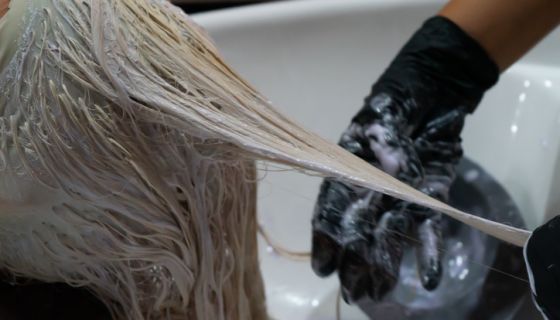
Source: Phamai Techaphan / Getty
At least 20 states have passed the groundbreaking CROWN Act, an imperative bill that shields individuals from discrimination over natural and protective hairstyles in the workplace and other institutions. But as the bill continues to make strides across the nation, some Black women are still facing hurdles when it comes to their natural coils.
A new study co-commissioned by Dove and LinkedIn found that Black women’s hair was 2.5 times more likely to be perceived as unprofessional in the workplace. The data also revealed that 66 percent of Black women often change their hair for a job interview, with many opting for a straight hairstyle over their natural tresses.
Around 54 percent of participants said they felt they had to wear their hair straight in order to be seen as a professional or deemed successful. Some women said they experienced uncomfortable microaggressions from coworkers or higher-ups when wearing their natural or textured hair in the workplace.
“More than 20 percent of Black women aged between 25-34 had been sent home from work because of their hair,” the study noted.
Young black professionals are feeling the brunt of the hair discrimination crisis
The data revealed that 44 percent of participants were Black women under the age of 34. Many reported that they felt pressure to take a headshot with straight hair. Around 25 percent of participants said they had been denied a job interview or overlooked for opportunities because of their hair.
“For far too long, black women and men have been subject to unfair treatment, outright discrimination and a myriad of inequities for simply wearing our natural hair texture and hairstyles that are inherent to our cultural identity,” said Esi Eggleston Bracey, President & CEO of Unilever Personal Care in North America in a statement.
“This includes being denied employment, being sent home from work, being overlooked for promotions and a range of microaggressions. This may be hard to believe, but it is real, clearly unwarranted and unacceptable,” she added.
Minnesota passes the CROWN Act. Michigan fights to implement the historic bill
The fight to end race-based hair discrimination still continues, but thankfully, some states are making considerable strides to fight back against the issue.
On Feb. 1, Minnesota became the 21st state to pass the CROWN Act after Gov. Tim Walz signed the bill into law, HR Dive reported.
“Discrimination has no place in Minnesota,” Gov. Walz said in a statement. “By signing the CROWN Act, we are sending a message that Black Minnesotans deserve to live and work free from discrimination. Today we are taking an important step in creating a more equitable Minnesota.”
According to NewsOne, on Feb. 21, Sen. Sarah Anthony of Lansing and several other Michigan state representatives introduced the CROWN Act to officials in the Michigan Senate to safeguard residents with natural and coily hair from discrimination.
If passed, the CROWN Act would further amplify the state’s Elliott-Larsen Civil Rights Act, a law that prohibits discrimination based on hair texture and race-based hairstyles, including braids, dreadlocks, twists and afros. Currently, the bill bans discrimination in areas such as education, housing and employment on the basis of race and religion.












